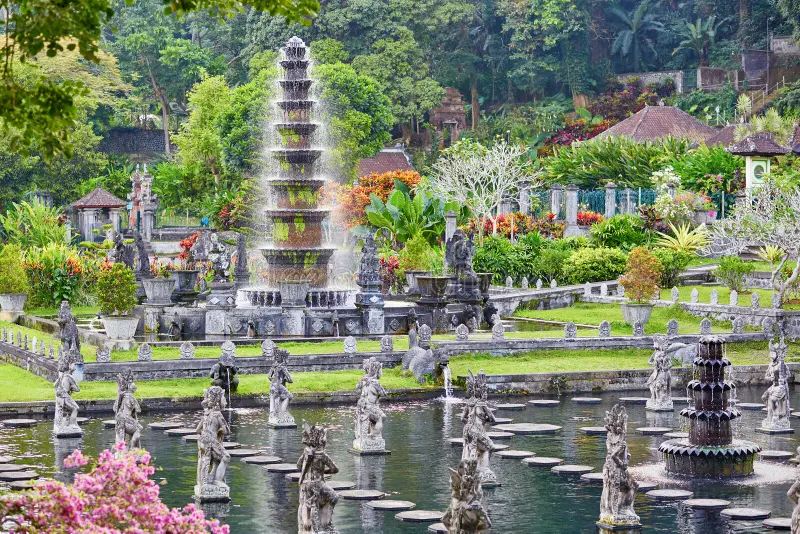Melukat is an ancient Balinese Hindu purification ritual that uses holy water (tirtha) to cleanse the body, mind, and spirit of negative energy. A temple priest usually leads the ceremony, guiding participants through prayers and offerings known as canang (flower offerings). The ritual typically ends with a cleansing bath under sacred springs or temple fountains.
In recent years, melukat has gained popularity among wellness tourists and expats, thanks in part to social media and celebrity travel posts that have turned the sacred rite into a “must-do” cultural experience.
Important note: Visitors must dress and behave respectfully when entering temples that host melukat rituals, as these are considered sacred spaces. A sarong and sash are required. Quiet conduct is also encouraged throughout the ceremony. While each site may have slight differences in ritual practice, the spiritual goal remains the same: to purify the self and restore harmony. Here are four recommended melukat locations across Bali that provide cultural insight and offer deeply personal moments of reflection for both locals and visitors.
Pura Tirta Empul, Tampaksiring (Ubud/Gianyar)
Located in Central Bali, about 1 hour north of Ubud (Tampaksiring village, Gianyar). Well signposted and reachable by car or bus. People built this 10th-century water temple around a sacred spring. Its main purification pool is fed by dozens of carved stone fountains. Worshippers make offerings then enter the pool of holy water to wash under the fountains.
Pura Campuhan Windhu Segara, Padanggalak (Denpasar)
Southern Bali, in eastern Denpasar near Padanggalak Beach. Easily reached by car or scooter (about 10-15 min from Ngurah Rai Airport). The temple sits right on the campuhan (confluence) where a mountain stream meets the sea. It’s one of the few beachside melukat sites. Balinese believe the mix of ocean and river water is especially purifying. Priests say many visitors come here to “cleanse the body and soul” (pengelukatan). You will see locals praying in the temple courtyard then wading into the brackish water to complete the purification.
Practical tips: Bring two full offerings (pejati): one for the ritual and one to place in the temple courtyard. Also prepare a young coconut (klungah nyuh). People use its yellow flesh during the cleansing prayers. Visitors must wear modest dress, such as a sarong and sash. Show respect by bowing at the altar and avoid splashing others. Many foreign tourists try this fresh-air melukat, so expect some other groups on weekends.
Pura Luhur Tamba Waras, Sangketan, Penebel (Tabanan)
West Bali, in the mountain village Sangketan (Penebel), on the southern slope of Mount Batukaru. It’s about a 2-hour drive from Denpasar. The temple is set among cool, forested hills near rice terraces. “Tamba” means medicine in Balinese. This quiet temple is famed for healing and purifying rituals. Balinese visit to pray for relief from illness or negative karma. It feels very secluded and authentic (few tourists). The tranquil jungle surroundings make it feel like a true retreat.
Practical tips: The priest will guide you through the ceremony, including prayers and bathing under the spring sprouts, and will then give you a small black-white bracelet as a blessing. It can be quite cool here, so bring a light jacket. As always, be quiet and follow the ritual steps to show respect.
Pura Tirta Gangga, Ababi (Karangasem, East Bali)
East Bali, in Ababi village (Karangasem Regency). About 60 km northeast of Denpasar, near Amlapura. A paved road leads up to this royal water-palace temple complex. The Karangasem royal family built this stunning 18th-century water palace. The builders laid out the temple with 11 pools, fountains, and lotus ponds, all fed by mountain spring water. They dedicated the temple to Dewa Tirta, the water god. Visitors and locals frequently bathe here, believing that dipping into these holy pools helps purify the body and soul. The gardens and stone carvings (Chinese-Balinese style) make it one of Bali’s most photogenic temples.
An entrance fee applies (ask your driver or at the gate). Men can bathe shirtless in the pools, women should keep shoulders covered. Before entering any pool, drop your foot in gradually, the water can be surprisingly cold. Many tourists simply wade and dip hands/feet, but feel free to carefully immerse yourself following the local rituals.
Each of these sites offers a deeply Balinese cultural experience. Whether you’re an expat seeking spiritual renewal, or a traveler curious about local traditions, melukat can be a meaningful way to engage with Bali’s living culture. Remember to go with an open mind and a respectful attitude.
Sources: nzherald.co.nz, gustibali.com, finnsbeachclub.com, detik.com.
Featured Image by Ekaterina Pokrovsky (Dreamstime.com)

